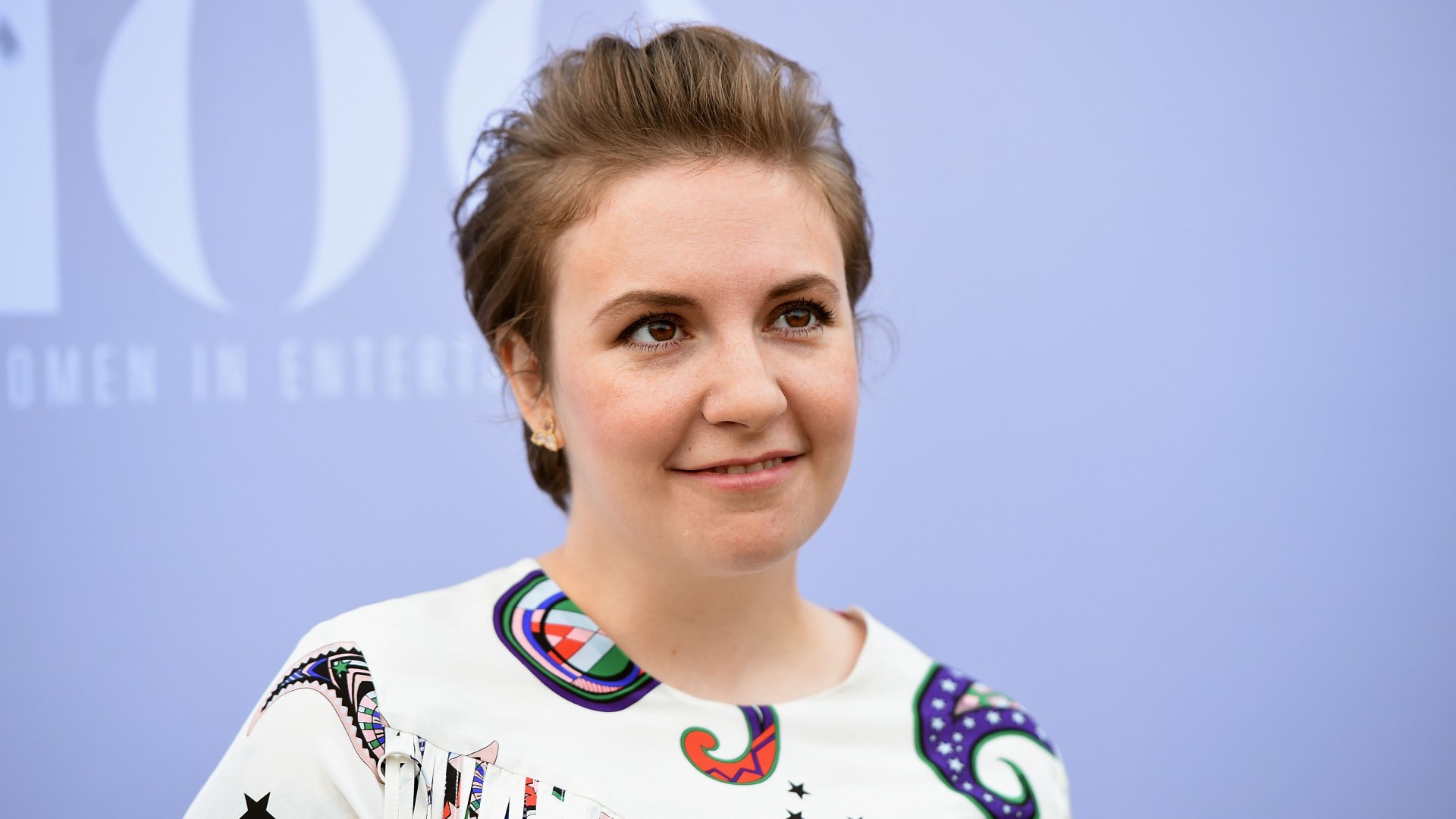Lena Dunham Will No Longer Allow Herself to Be Photoshopped: "I Bid Farewell to an Era When My Body Was Fair Game"
In a new Lenny Letter essay, Dunham draws the line.


Sign up for Lenny, a newsletter about style, health, politics, friendship, feminism and everything else from Lena Dunham and Jenni Konner.
Last week, I was surfing Instagram, peering in at the lives of people I don't actually know (your baby's handmade vintage clothing looks amazing, @mintkarla!) and seeing what images I'd been tagged in. My tags are usually a hodgepodge of inspirational quotes, white feminist faces arranged into a pentagram, and anything having to do with Taylor Swift (love you, Tay, and I respect the commitment of these fans!). Amid the mayhem, one picture caught my eye: an iPhone photo of a Spanish magazine, its headline unreadable to me, though I did see a word resembling feminist. On the front of the issue was me, eyes wide and kohl-lined, doing my best Twiggy impression.
I was assisted in this impression not just by a pixie cut and a chic white jumper but also by what was clearly — to me — some skillful Photoshop. My chin was strong and defined, practically another continent from my neck, and my legs and arms were lean and milky white instead of their usual mottled pink. I'm not sure what it was about this particular image that set me off. It's three years old, is licensed often, and was taken by a photographer I love. But I felt a need so immediate it was like demanding that a driver pull over so I could go to the bathroom despite being in the middle of a five-lane highway.
I wanted to tell people, loudly: "That's not my body!"
What followed was a he-said-she-said that probably should have embarrassed me, were I more easily embarrassed. The magazine said (with good humor) that it had never retouched the image, that it had gotten it from the photographer (a man who has always made me feel beautiful and special), and that it had been approved by my publicist (a smart, classy chick). The picture originally ran in Entertainment Weekly in 2013, and that publication also claimed "no Photoshop," saying they'd simply raised my hemline and made my skin less magenta (whatever that means).
"I also found it charming and appealing. But in the same way I find Emily Blunt charming and appealing: she's not me."
I didn't have the energy or the drive to figure out at what point in its journey this image had lost my dimpled thighs or bulge of bicep fat, or whether my chin had been recrafted. I also didn't have any interest in shaming or blaming anyone in the process. Every one of these people was being kind to me, supporting and protecting me by releasing an image they found charming and appealing. I also found it charming and appealing. But in the same way I find Emily Blunt charming and appealing: she's not me.
So was the image Photoshopped somewhere between raw digital file and Spanish glory? I think so, but who knows and really, who cares. But seeing the photo got me thinking about the real issue, which is that I don't recognize my own fucking body anymore. And that's a problem.
Get exclusive access to fashion and beauty trends, hot-off-the-press celebrity news, and more.
The first time I experienced Photoshop was in third grade, when my mom's friend Karen took me to her job at Allure magazine on Take Your Daughter to Work Day (best holiday ever). I spent most of the day in the layout department, where the kindly computer dudes took a Polaroid of me, scanned it, and slapped my head on the body of Claudia Schiffer, their current cover girl. For the next five years a picture of me as Claudia Schiffer, posed demurely in a pink angora sweater, hung above my bed, my most prized possession.
In my early 20s, I sat on the couch of a boy I wanted to kiss while his roommate showed me her work as a retouching artist. I was transfixed by the subtle changes she made — lifting breasts, sculpting abs where they weren't, lengthening a model who was already impossibly long. She was even tasked with making diamonds sparkle. I made her show me the before and afters, over and over, gasping like I was on acid and seeing, really seeing, man, the truth of the universe.
When I started getting photographed by professionals to promote my work, it didn't occur to me to ask about, or to question, the use of Photoshop. I was 24, and whatever they did to make women appear important, desirable, and worthy of praise was what I wanted. When my skin seemed almost painted on, when my nose was thin and pointed, I felt grateful for the future Google image search a potential paramour would enjoy, replacing a few candids of me with angry red zits at an indie-film-festival party. Considering my commitment to showing my realistic body onscreen, this was a kind of cognitive dissonance I didn't want to, and couldn't yet, consider.
When I landed a Vogue cover in 2014, I was thrilled. I have loved Vogue since childhood, when I'd heft it into bed with me, rubbing the perfume samples all over my body and dreaming of a chic British life like a Sykes sister. The shoot was a fantasy, and I felt, perhaps for the first time ever, like a glamorous adult with a body worth wanting. The clothes were stunning. The stylists and crew were kind. Annie Leibovitz asked me to stare at her plaintively, and I did it, but I couldn't hide the joy dancing in my eyes.
So when, immediately after my cover was released, the website Jezebel decreed it a Photoshopping atrocity and offered a $10,000 bounty for anyone who could get them the raw photos, I was no less than heartbroken. That was partly because my college self had loved Jezebel for this very trait, a desire to topple the body-image industrial complex with a wink and a cackle. It was and it remains an admirable goal.
But I also asked, "Why me?" All these other actresses and models get to enjoy their subtly perfected fashion spreads without comment. Was I being punished for being different, for having an inherently political body? Was I being called out on the chasm between the goals of my television show and the reality of posing in Vogue in a fancy dress and a support garment? Those were fair lines of inquiry for Jezebel, but it still felt like having the stuffing ripped from my bra at the seventh-grade dance. Would I ever get the chance to just be beautiful, no questions asked?
"Would I ever get the chance to just be beautiful, no questions asked?"
Two years later and I've done countless shoots since, heard photographers say "We'll fix it in post" and known on some level that they don't just mean the odd shadow or wrinkle in my skirt. They mean the parts of me that are ungainly and overstuffed. They mean the parts that hang over waistbands and bubble out from under Spanx. The parts that are too much and are evidence of wanting too much, of unappealing hungers. But I didn't ask questions, assuming this was the game that made the rest of my creative life possible. I also didn't ask questions because it feels nice to look at a photo of yourself where everything that's ever felt like too much is suddenly under perfect, glossy control.
But something snapped when I saw that Spanish cover. Maybe it was the feeling of barely recognizing myself and then being told it was 100 percent me but knowing it probably wasn't and studying the picture closely for clues. Maybe it was realizing that was an image I had at some point seen, approved, and most likely loved. Maybe it was the fact that I no longer understand what my own thighs look like. But I knew that I was done.
Not done with getting my picture taken (once an insufferable ham, always an insufferable ham) but done with allowing images that retouch and reconfigure my face and body to be released into the world. The gap between what I believe and what I allow to be done to my image has to close now. If that means no more fashion-magazine covers, so be it. I respect the people who create those magazines and the job they have to do. I thank them for letting me make a few appearances and for making me feel gorgeous along the way. But I bid farewell to an era when my body was fair game.
I'm not the first female actor to express this, to demand a different approach. I'm looking at you, Kate Winslet, Jamie Lee Curtis, Zendaya. Thank you for letting me know that making such a choice or statement was possible. If any magazines want to guarantee they'll let my stomach roll show and my reddened cheek make an appearance, I am your girl Friday. Anything that will let me be honest with you. But moreover, I want to be honest with me.
This body is the only one I have. I love it for what it's given me. I hate it for what it's denied me. And now, without further ado, I want to be able to pick my own thigh out of a lineup.
[newsletter type='lennyletter'][/newsletter]
